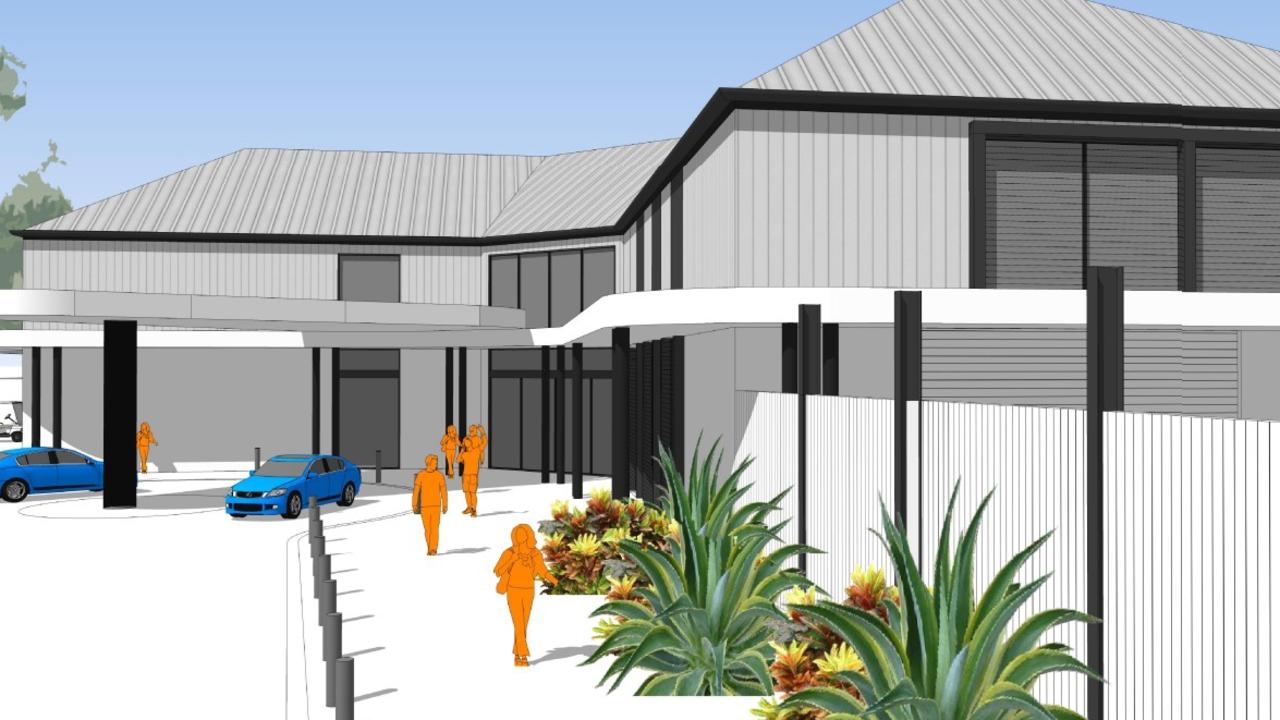Sydney rubbish collection: How your bin service compares with other councils
If you’re confused about bin collection rules, you’re not alone. From fortnightly collections to four bin systems, see how your council compares.
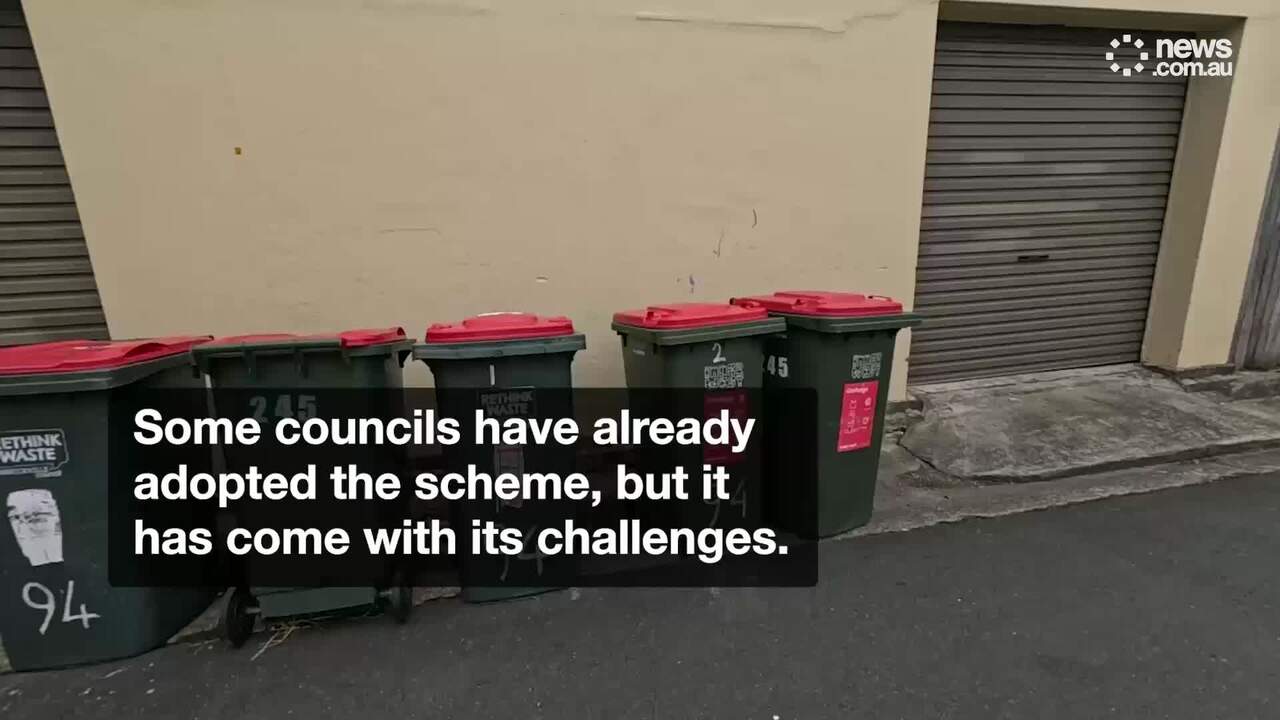
Local
Don't miss out on the headlines from Local. Followed categories will be added to My News.
If you live in Penrith, Randwick or the Inner West, there is a good chance your red bin is overflowing.
General waste collection services across the three council areas are only held every fortnight, while fellow Sydneysiders’ waste is collected each week.
With a number of councils recently applying for rate rises, and questions raised about wasting money when councils should be sticking to “roads, rates and rubbish”, NewsLocal reporters have broken down rubbish services across the city.
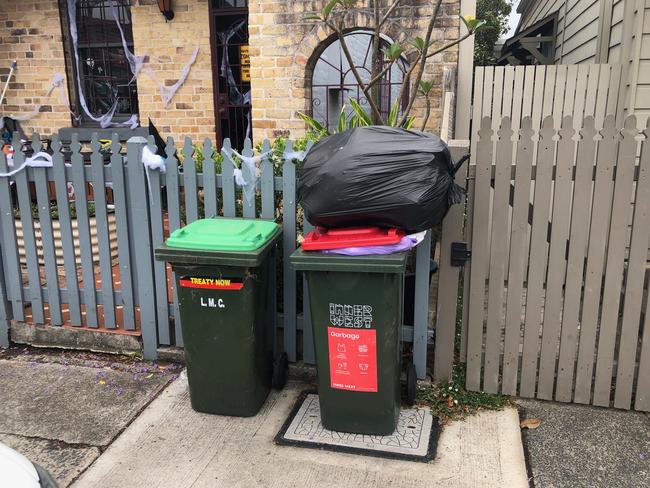
Fortnightly red bin collections are largely due to a NSW shift in rolling out the Food Organics and Garden Organics bin, or FOGO; a green lidded bin for food scraps – a move that has caused fierce backlash from residents over smelly red bins loaded with dirty nappies and dog poo.
Council Watch president Dean Hurlston accused councils of cutting costs by not offering weekly services.
“The core essential service that every residential property uses of council is waste and recycling collection,” he said.
“Every other council service is optional – so why can councils simply not agree and implement weekly collection as an industry standard?
“Those councils doing this fortnightly are simply cost cutting by reducing services and ripping off their communities. How about we run the broom through their corporate offices first?”
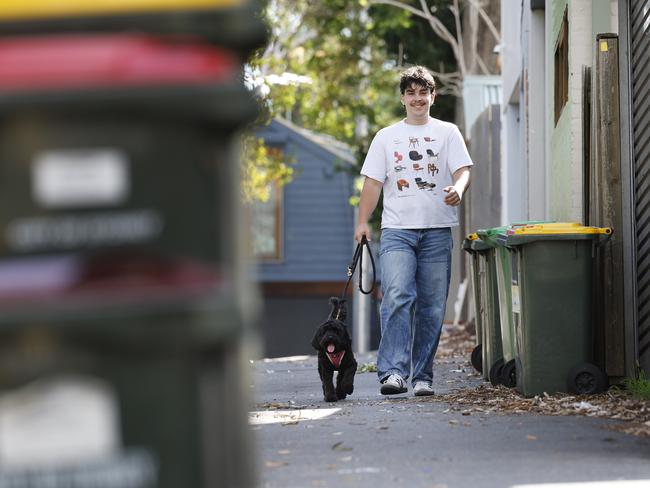
Nicholas Lovell, who resides just outside the affected area in Sydney’s inner west, said the issue of hygiene and liveability was clear.
“My household doesn’t produce a lot of waste,” he said. “But even if we don’t fill up the bins, there are items that smell in Sydney’s heat.”
“It’s creating a solution for a problem, but it’s created another problem.
“I understand and appreciate the utility of FOGO bins to reduce waste. However, weekly red bin pick-ups are not a luxury, they’re a necessity.”
Almost half the state’s councils have already rolled out FOGO bins, with many in planning stages. All NSW households will be required to have a FOGO collection from July 1, 2030, in an effort to reduce landfill.
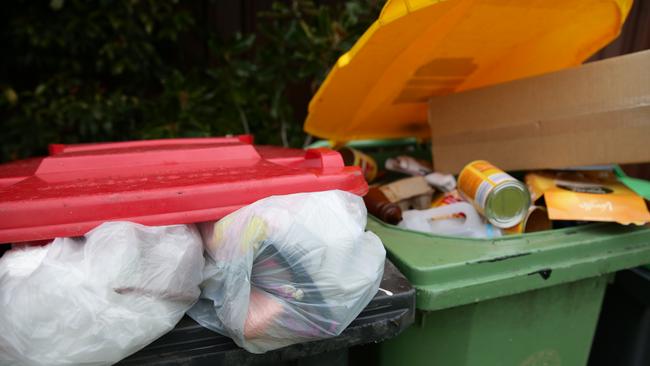
Meanwhile, four-bin rubbish systems are on offer in Lane Cove and Northern Beaches, with red, yellow and green lids along with an extra blue lid bin for paper and recycles.
In terms of bin size, Blacktown, Fairfield and Bayside residents are fortunate enough to automatically get the biggest red bin on offer – 240 litre – however residents can chose smaller options to save up to $130 in waste service fees.
If you want to upsize your red bin, you have to pay.
See how your council stacks up when it comes to services and garbage fees.
Blacktown
Blacktown Council has weekly waste bin collections, with fortnightly recycle bin collections.
Bin sizes are 240L but residents can save more than $130 in domestic waste service fees if they choose a smaller 140L waste bin.
Bayside
Bayside is one of few councils in the state that provides a 240L red-lidded bin as the standard size to residents for domestic waste services. These bins are collected weekly and sent to a mechanical biological treatment facility which sorts and diverts food and organic waste from landfill.
Camden
All bins – red, yellow, and green – are collected weekly.
Recycling and garden organics bins are 240L, while the general waste bin is offered in various sizes for residents with 80L, 120L, or 240L options.
The average residential rates in the Camden LGA are $1526 per year, with the most commonly used domestic waste service using a 120L general waste bin, costing $424 annually.
Campbelltown
Campbelltown Council conducts weekly collection of red bins with general household waste, and alternating fortnightly pick ups for yellow recycling bins and green garden organic bins.
The standard bin sizes are 140L for red bins and 240L for green and yellow bins, but residents do have the option for additional bins at an extra cost.
The average residential rate for Campbelltown residents is $2082.22 a year, with $613.68 accounting for waste management services.
The domestic waste management charge has increased by $156 since mid 2024 because of the expiration of Campbelltown Council’s previous contract.
“The market rate for waste disposal has increased significantly over the course of the original contract, and our residents have had access to very competitive pricing compared to other areas,” the council’s website states.
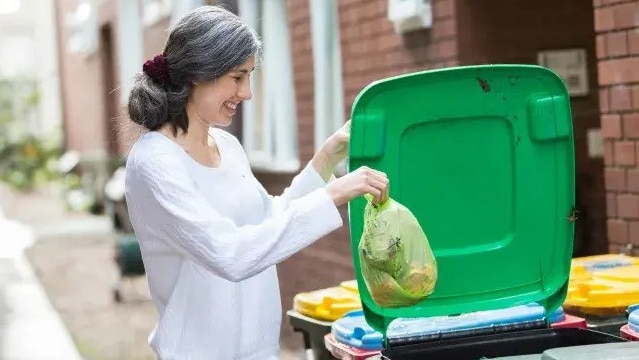
Burwood
Burwood Council collects its locals red bins weekly, while the yellow and green bins are collected fortnightly.
All residential houses are entitled to one 120L general waste bin, one 240L recycling bin and one 240L garden waste bin.
Residential rates for bins range with red bins costing between $59.50 and $249, yellow bins costing $19 and green ones priced at $32.
The average cost of residential rates in the Burwood LGA is $1677.25 a household.
Canada Bay
Canada Bay Council collects red bins weekly, while the yellow and green bins are collected fortnightly. Residents pay $460 annually for all waste management rates.
Standard bins of 120L cost $460 for the year while the 240L bins cost $749.
Cumberland
At Cumberland, regular domestic wheelie bins are collected weekly, while yellow recycling and green bins for green waste are collected fortnightly.
Fairfield
Fairfield Council offers most residents three 240L bins for all of their domestic household waste needs. The 240L red-lid general waste bins are collected weekly, while the green food and organics (FOGO) bin and yellow bins are collected fortnightly.
Residents living in units or apartments are not provided with green FOGO bins, but the council website states this service will be extended to them “at a later date”.
The council also gives residents the option of two free kerbside collections a year.
Each year Fairfield residents pay an average of $522.62 in waste management fees.
Georges River
The southern Sydney council collects red general waste bins weekly while recycling bins are removed fortnightly.
Hawkesbury
The council provides general waste (red) and recycling waste (yellow) services to all residences and businesses, and a green waste (green) service to residences and businesses in select urban areas.
General waste is a weekly service. Recycling and green waste is collected fortnightly on alternating weeks.
The standard bin service is a 140L general waste bin and a 240L recycling bin (plus a 240L garden organics bin for selected urban areas). A 240L general waste bin is available upon request for a higher fee.
All properties in the Hawkesbury pay a base amount of $785.00 and the average residential rate is $868.27. The total annual average is $1653.27.
Hills
Hills Shire bins are collected once a week for general waste and fortnightly for recycling and garden waste.
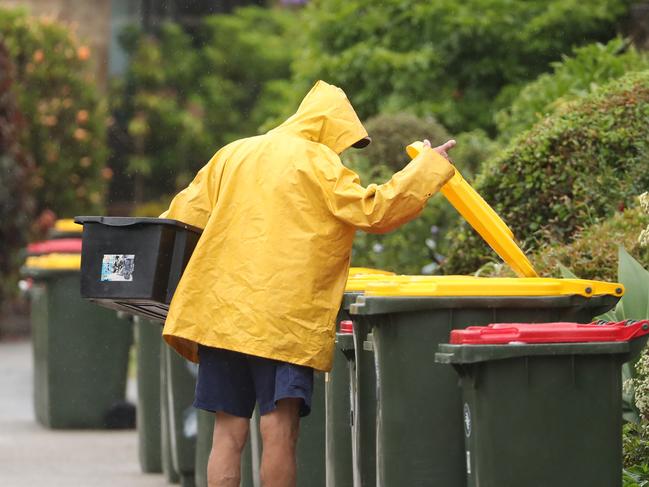
Hornsby
The upper north shore council collects red 140L bins from houses weekly while yellow 240L and green 240L bins are emptied on alternate fortnights.
Residents in townhouses and villas receive a 240L garbage bin collected twice a week and a 240L recycling bin collected weekly. No green waste bins are allocated to residents in these dwellings.
Residents living in apartment blocks under five storeys are allocated a 240L or 660L garbage bin, collected twice a week while 240L recycling bins are collected weekly.
All unit and apartment complexes are entitled to two 240L green lid waste bins for property maintenance.
Those living in apartment complexes six storeys and above are allocated 660L or 1100L garbage bins, collected three times a week while 240L recycling bins are emptied twice a week.
Hunters Hill
General waste red bins are collected weekly while recycling and green bins are collected every fortnight.
The red bins are 80L, 120L or 240L while paper recycling (blue) bins are 120L or 240L and the recycling (yellow) bins are 120L or 240L. The green vegetation bins are 240L.
The size of the red bins alter the rates payable for the property. The yellow, blue and green bins are complementary with the red bin services. The size of the yellow or blue bins has no bearing on the total rates payable.
A red 80L bin is $448.58, $656.05 for domestic and $953.23 for 240L.
Residents who require an additional red bin service are charged the full amount as the prices above.
Each individual additional yellow, blue or green bin will each incur an additional rates charge of $179.43.
Inner West
After switching to FOGO bins in 2023, the Inner West Council had a huge overhaul of its former system which saw two of its bins switch to fortnightly pick ups including general waste and yellow bins.
The FOGO bin is collected weekly.
The switch caused no rate rises to locals but will still see residents forking out $397.50 for a bin smaller than 120L, $530 for 120L and $795 for a 240L.
Ku-ring-gai
General waste red bins and green bin waste is collected weekly while recycling is serviced fortnightly. Green waste bins are optional for units and apartments.
Lane Cove
The council provides households with a red general waste bin, yellow recycling bin, blue paper and cardboard recycling bin and green vegetation bin. The red-lidded general rubbish bin is 80L. The yellow, blue and green bins are serviced fortnightly with general waste being removed weekly.
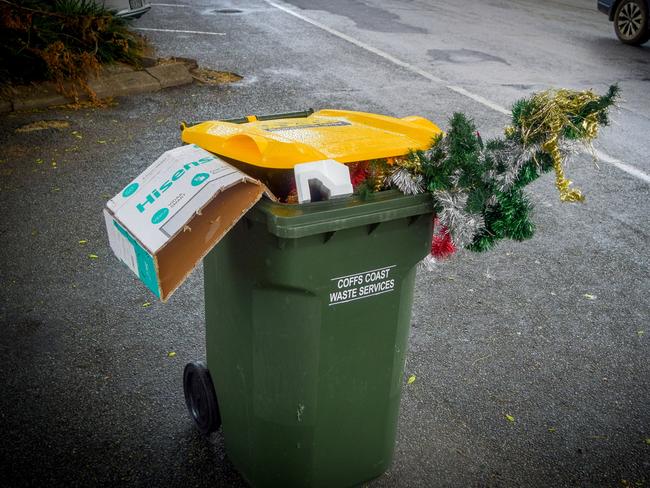
Liverpool
Liverpool Council’s red-lid waste bins are collected weekly and the yellow-lid recycling bin and green-lid garden waste bin are collected on alternate fortnights.
Liverpool provides residents living in single-unit dwellings with a 140L red-lid general waste bin, 240L yellow-lid recycling bin and a 240L green-lid garden waste bin.
In rural areas where garden waste is self-managed, residents receive a 240L red bin and yellow bin.
A council spokesman said the council will soon roll out FOGO collection in green bins which will “reduce its landfill waste by up to 40 per cent”.
The average rate payment for Liverpool LGA residents is about $1288 a year.
The council website states that residents are billed an extra $620 annually for domestic waste services, as “costs of these services cannot be financed from ordinary rates”.
Mosman
General waste is collected weekly in houses and units. Dwellings also have a 140L blue bin for paper and cardboard which is collected fortnightly, alternating with 140L yellow recycling bins. The council charges a domestic waste charge that is based on the user, where the amount invoiced is determined by the size of the bin, meaning smaller bins have smaller charge rates.
North Sydney
The council provides an 80L red general waste bin and a 120L yellow recycling bin of 140L that is collected weekly. Green garden waste bins are not provided, with individuals having to purchase through the council directory.
Northern Beaches
The council, which services a population of about 270,000 residents, has a four-bin separation system to give it, what it describes as, the “best chance to recycle and reuse household waste”. It provides households with a weekly collection of a “red” general household waste bin – of 80L. It provides a fortnightly collection of “blue” paper recycling bins (140 litres) and “yellow” glass and plastic bins (140 litres). It provides a fortnightly collection of green waste bins (240 litres). Homeowners may request extra bins – for an annual fee of $326.
Parramatta
The council’s red and green bins are collected weekly and come in 80L, 140L and 240L.
The council started its green FOGO service in November after community consultation.
About 65,000 properties have access to FOGO. The red-lid garbage and green FOGO bins are collected weekly and yellow recycling bins fortnightly.
A council spokeswoman said as a result of the introduction of FOGO and the 80L red bin, residents saw an introduction of $42.69 in their annual waste charge.
“Those that opt to keep a 140L red bin will see no change to their waste charge,” she said.
“In response to community feedback, we’ve worked hard to shape a service that will significantly reduce our waste going to landfill and meet the NSW Government’s mandate for all councils to implement FOGO services by 2030.’’
The average residential rates are $1631 which includes (on average) about $500 of domestic waste and stormwater charges.
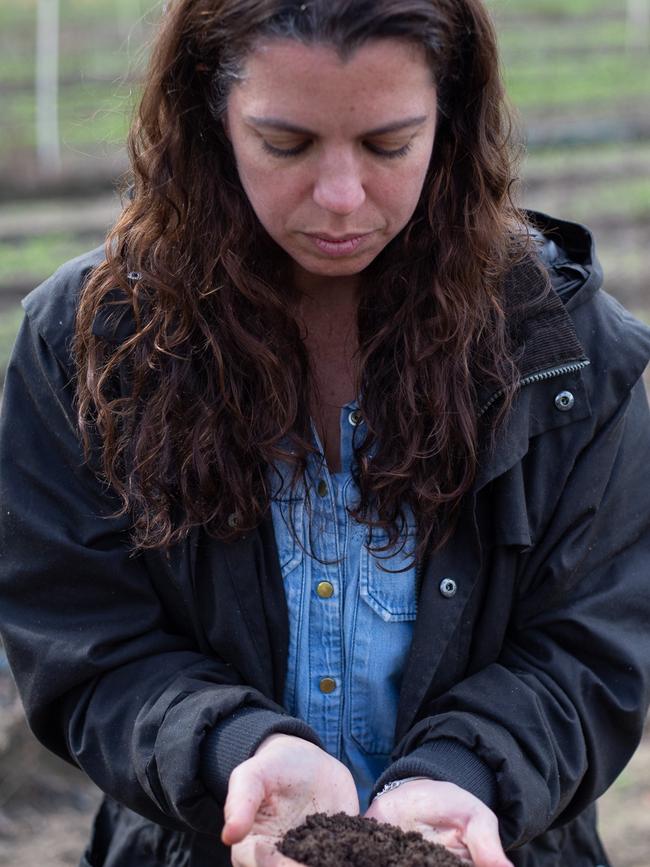
Penrith
Penrith Council operates red, yellow and green lid bin collection services, and was the first council to adopt FOGO recycling in Sydney in 2009.
The cheapest option is $487 a year and includes a 240L FOGO bin collected weekly and a 240L recycling bin and 130L general waste red bin collected fortnightly.
The most expensive option is the weekly large residual waste service at $965 a year, which includes all three bins at 240L each. Under this option, the FOGO and red lidded bins are collected weekly.
It is also noted on the council’s website that households can nominate to swap the sizes of the FOGO bins if needed at no extra cost.
Randwick
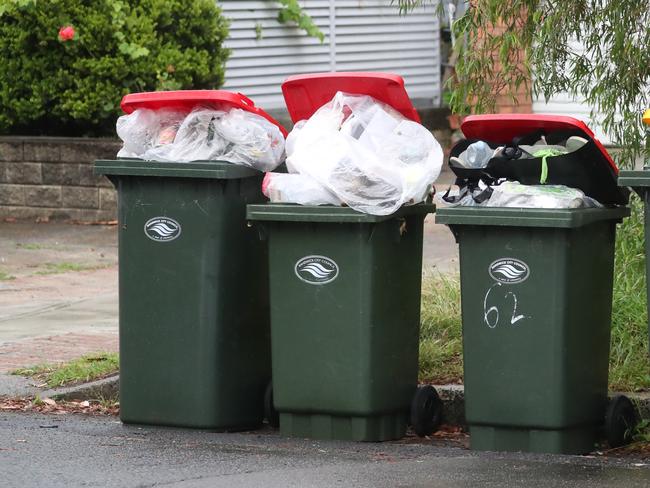
Due to the introduction of FOGO bins, red rubbish bins are removed fortnightly for all houses however weekly in apartment buildings. Yellow bins for recycling are removed fortnightly and FOGO bins are collected weekly.
Ryde
Each household is provided with one 140L red lid garbage bin that is emptied weekly.
Small apartment buildings are allocated a 240L red lid garbage bin for two units which are emptied weekly. Large apartment buildings are provided with 1100L bins to be shared between multiple units which are serviced three times a week.
Sutherland
Sutherland Council collects red bins each Wednesday while recycling and green waste collections are held every second week.
Sydney
The City of Sydney collects its residents’ red and yellow lid bins weekly while the green bin is fortnightly.
Red and green bin sizes range from 50L, 70L, 80L, 120L and 240L, while the yellow bin is available in either 120L or 240L.
While the average common waste charge to residents is $509, this can vary depending on if locals request multiple pick ups throughout the week.
Waverley Council
At Waverley Council, red bins are collected weekly, and yellow and green bins are collected fortnightly. In October 2024, the council introduced a food organics and garden organics (FOGO) collection trial that will continue for a year. About 2000 households are included in the initial year, aimed at encouraging food scraps to be processed for composting.
Willoughby
Willoughby Council empties the general waste, recycling and vegetation bins every week. Each rubbish bin has a weight limit of 80kg.
Wollondilly
Wollondilly Shire Council provides general waste and recycling bins to all residential properties but only provides garden organics bins to properties less than 4000sq m.
General waste (red bins) are collected weekly, while recycling and garden organics are collected fortnightly.
The available bin sizes are 120L or 240L for general household waste red bins, 240L or 360L for recycling yellow bins and 240L for garden waste green bins.
The charges for each resident varies based on the service they have and size of the bins, but for residents that have all three bins and a 120L red bin, they pay $677 annually. Rural residents with no green bins are charged $585 a year.
Woollahra
The Municipality of Woollahra council has organised for red, yellow and green rubbish bins to be serviced and removed every week. The council is recommending individuals to put food scraps into green lid bins.




